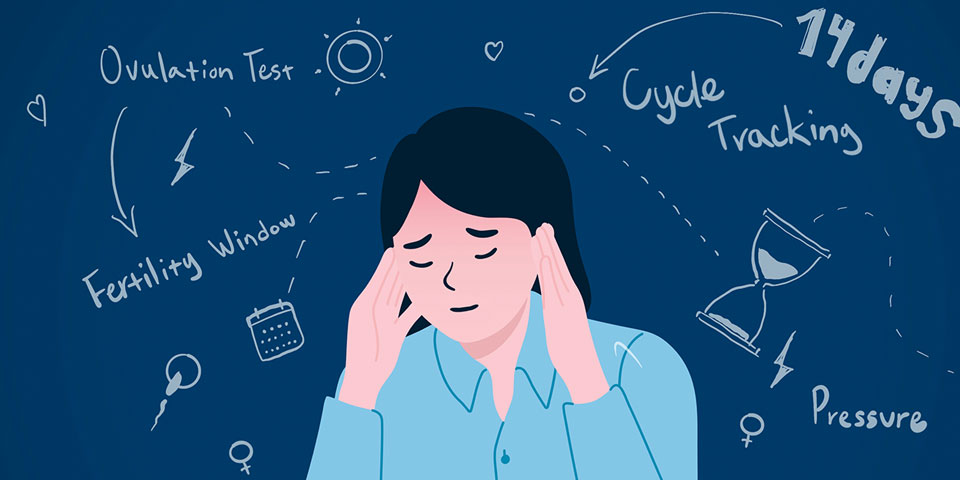6 ways to manage stress if you feel like you’re “obsessing” over getting pregnant

Tracking your fertility. Buying another test. Googling “How to get pregnant faster” (again). Trying to conceive (or TTC) can be an extremely stressful time. You may even be stressed about being stressed, wondering if stress can affect fertility. Here are six ways to manage stress as you try for a baby.
Can stress cause infertility?
Stress is a normal part of life, and stress alone can’t cause infertility. However, stress can affect your chances of pregnancy.
Too much mental or emotional stress when you’re trying to conceive can:
- Lower your sex drive. With less interest in sex, you likely won’t have sex as often. This can, of course, reduce your chances of getting pregnant.
- Prevent ovulation. Stress can increase your risk for anovulation, which is when an egg is not released from your ovary during your menstrual cycle.1
Feeling stress is nothing to be ashamed of — often, it can result from caring a lot about your choices or goals. Deciding to start a family is a big and exciting step, and feeling a little stressed about it (or just about balancing your life while you’re trying to conceive) is completely valid. Stress itself doesn’t imply anything about you or your choices. Rather, it’s just a side effect you’re experiencing — and one that can be handled in several ways.
How do I not stress about getting pregnant?
Being emotionally prepared for trying to get pregnant is easier said than done. TTC can cause a lot of stress for you and your loved ones.
But at the end of the day, you’re so much more than your stress. Your stress doesn’t define you. And we’ve got six ways to help you manage it on your conception journey.
1. Sit with your feelings, even the rough ones.
Often, trying to conceive isn’t a straightforward journey — there can be many ups and downs along the way. Don’t feel pressured to stay positive all the time, especially if you’re experiencing infertility or TTC is taking longer than you anticipated. Allow yourself to feel sad, frustrated, disappointed or just plain tense. Think of it as being honest and vulnerable with yourself — you don’t owe constant “good vibes” to anyone. And pretending you’re feeling good when you aren’t? That’s a recipe for even more stress.
2. Write down your thoughts about the journey so far.
If you’re finding it hard to understand your thoughts, you can always try writing them down. Journaling can help you process your feelings into more tangible words. By getting it all on the page, you can take some pressure off your mind and feel more at ease. You might even be able to notice patterns of high-stress times: Do they sync up with certain times in your cycle? Are there situations that trigger them?
3. Try something new to take your mind off TTC.
Trying to conceive can make it hard to do what you once loved. Maybe a glass of wine used to be your go-to way to unwind before you started your conception journey, or you miss going to your favorite sushi restaurant now that your usual order is off the menu. Instead of dwelling on what you can’t do, focus on what you can do. Take this as an opportunity to try a new hobby, perhaps something you’ve always wanted to do. This can help you get more excited about what’s ahead.
4. Reach out to someone when TTC gets overwhelming.
Trying to conceive is a very personal and intimate journey, but that doesn’t mean you can’t seek help from others. In fact, this is a great time to bond with your partner and lean on friends and family for a little extra support. Also consider talking with a healthcare professional or therapist, or joining one of the many TTC support groups out there ready to help you.
5. Be intentional about how much you use social media.
While social media is great for staying connected to loved ones, it can also create room for comparison. Seeing your feed filled with pregnancy announcements could give you something to celebrate with your friends … or remind you of how much you wish you could post your own … or even bring on both reactions at once. Give yourself permission to unplug from social media, or try limiting how and when you use it. It’ll still be there when you’re ready to come back.
6. Prioritize yourself, every day.
When it comes to pregnancy, you’ll encounter a lot of advice for how to do what's best for your baby — but your health is just as essential. Try to carve out some time every day to do what makes you happy. Exercise a little if that helps relieve stress for you. Watch your favorite TV show. Eat a healthy diet (with a nice, indulgent snack every now and then). Do a mini-spa day with a face mask or an Epsom salt soak. Look for forms of self-care that make you feel good during and after — so you’ll enjoy them in the moment and feel better long-term.
Trying to get pregnant can be a very stressful experience. It’s not always positive or straightforward, even if we want it to be. If you’re concerned about potential fertility problems you should reach out to your doctor as soon as possible.
Your feelings are valid. Remember that you can always take a break from trying to get pregnant if you need to — and remember to take care of yourself.
Sources
- Karen C. Schliep, Sunni L. Mumford,a Catherine J. Vladutiu, Katherine A. Ahrens, Neil J. Perkins, Lindsey A. Sjaarda, Kerri A. Kissell, Ankita Prasad, Jean Wactawski-Wende, and Enrique F. Schistermana. “Perceived stress, reproductive hormones, and ovulatory function: a prospective cohort study” National Library of Medicine. 2015. Accessed 29 Sept 2022.
https://www.ncbi.nlm.nih.gov/pmc/articles/PMC4315337/

When to start testing for ovulation?
You'd like to use a Clearblue® Ovulation Test and are wondering when you should start testing? Our tool can help you!

How to identify your most fertile days
Knowing your most fertile days is key if you are trying for a baby. Discover the signs, symptoms and methods that can help you identify them.




